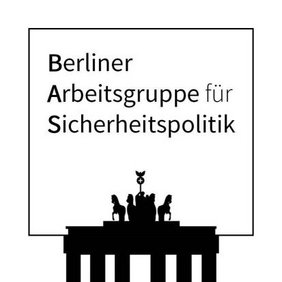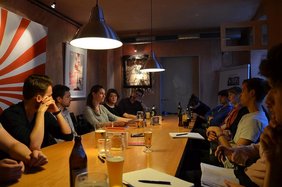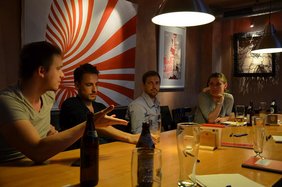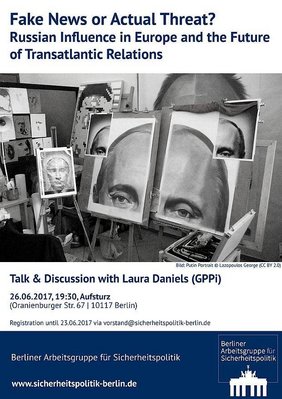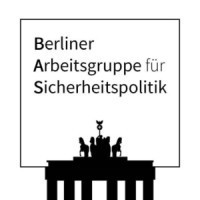On June 26, 2017, the Berlin Academic Society for Security Studies (BAS) invited Laura Daniels, German Chancellor Fellow at the Global Public Policy Institute (GPPi), to discuss her latest research on Russian vectors of influence, defensive measures taken in Germany and France, and the political implications of these activities.
It is important to point out that while Russian influence in Europe might be back in the public discourse, it is not at all a new phenomenon - during the Cold War, the former Soviet Union used strategies not so different from what we see today. Laura Daniels, who holds a master’s degree in public administration with a specialization in international security policy from Columbia University and worked at the Brookings Institution, the European Parliament Liaison Office to U.S. Congress, and the United Nations, had just returned from a visiting fellowship at IFRI (Institut Français des Relations Internationales / French International Relations Institute) in Paris where she analyzed French reactions to Russian operations during the recent presidential elections. She started her talk by arguing that influencing France and Germany was already a primary focus of the Soviet government. Propaganda through the media and what we would today call leaks were used back then, as were the support of protests, political parties, and armed groups. Moscow also backed a broad network of people who unwittingly or wittingly supported Soviet goals in Western European states. Even more pertinent to today’s discussion is that some of these operations were aimed at past French and German elections.
These tools have not changed much since the Soviet days. Propaganda via the media was used, for example, in the ‘Lisa case’, and there is Russian support for mostly far-right parties in Europe. The goals also mostly stayed the same, from the breaking of international alliances, to damaging politicians deemed anti-Russian, to general destabilization efforts. But according to Laura, there are four key elements that have changed how these strategies work: Cyber, communication and information networks, soft power, and ideology. Russia has invested heavily in its cyber capabilities and widened its use, with the favorite tool being hacks and the subsequent leaking of real and forged information. But there are also more mundane activities, such as search engine optimization, which leads to pro-Russian news sources being prominently displayed in web searches. The second point, global communication and information networks, has made it easier for Russia to use its informational tools of influence. Distribution of propaganda is less costly and more effective over the internet, and what is often referred to as fake news is then not used to convince people of its content, but to overwhelm them and make them question every news report they encounter. The third element, soft power, has become increasingly important in Russian strategic thinking, and means for example the support of Western organizations that support closer ties with Russia. Finally, ideology has changed from the centralized promotion of Communism as the one true way of how the world should be - today’s Russian model is more conservative and sets itself up as an alternative for those disappointed in the Western model.
But how effective are these strategies really? It is hard to measure, but they might work cumulatively over the long term, can affect the margins and tight elections, and can augment existing movements or exacerbate fissures in targeted societies. Looking at the Cold War, Laura gave examples of some cases which were attributed to Soviet influence, among them resignations of high-level politicians, increased momentum given to existing political movements, and incitement of tensions between groups in targeted societies. Seeing these possibilities, it is understandable that both German and French politicians and officials are wary of Russian influence and have especially looked to improve their cyber defenses. There are also civil society and media initiatives aimed at teaching citizens how to spot propaganda and fake news. After an intensive discussion with the attendees, Laura closed with a somewhat optimistic note: As the German political system leaves little room for extreme outcomes, it may be less susceptible to these influence operations than other countries.



